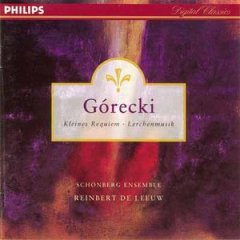Henryk Gorecki - Kleines Requiem, Lerchenmusik (1995)
Henryk Gorecki - Kleines Requiem, Lerchenmusik (1995)

Kleines Requiem fur eine Polka, op.66 (1993)
1. Tranquillo
2. Allegro Impetuoso – Marcatissimo
3. Allegro – Deciso assai
4. Adagio Cantabile
Lerchenmusik, op.53 (1984)
5. Lento – Largo
6. Molto lento – Tranquillo, Cantabile – Dolce
7. Andante moderato – Tranquillo, Cantabile
Schonberg Ensemble
Reinbert de Leeuw - conductor (and piano)
These two works have been recorded on separate Nonesuch CDs: Kleines Requiem for eine Polka on 79362-2 (coupled with the Harpsichord Concerto and Good Night) and Lerchenmusik on 79257-2 (coupled with the First String Quartet, "Already it is Dusk"). The earlier performances are by members of the London Sinfonietta, conducted by David Zinman in the former work. If you already have them, there is no need to replace the Nonesuch discs, but first-time buyers might well prefer the de Leeuw disc. First of all, it combines the strongest works from each of the two Nonesuch releases. Secondly, de Leeuw and the Schonberg Ensemble commissioned Kleines Requiem and were the first to perform it, so this recording, made just five months after the première, has historical importance. Thirdly, de Leeuw's performances are tougher, and they strongly contradict the unfortunate "New Age" image that has inappropriately settled on Górecki's music since the popular success of the Third Symphony. De Leeuw's timings are comparable to the London Sinfonietta's except in the middle movement of Lerchenmusik, which de Leeuw, de Boer, and Groeneveld take almost 17% more slowly.
As for the music itself, the more I hear these works, the more I respect them. The composer referred to Kleines Requiem as "circus music," but it really is a very serious work, even when it's bitterly flippant, as in the third movement. Lerchenmusic is even heavier - witness the work's granitic opening, in which the cello and piano park themselves on a handful of notes and refuse to budge from them. Later, there is some folk dancing (the second movement) and a hymn tune (the third), but the insistent, uncompromising textures align this work right between the so-called "spiritual minimalism" of the 90s and the Eastern European avant garde of the 60s. There's a strong taste of Messiaen, too; consider the bird song, and also that Lerchenmusic is lacking only a violin for its scoring to be identical to Quartet for the End of Time."
This is very compelling music-making, and well worth your attention. --- Raymond Tuttle, classical.net
download: uploaded anonfiles yandex 4shared solidfiles mediafire mega filecloudio
Last Updated (Friday, 29 November 2013 16:14)
